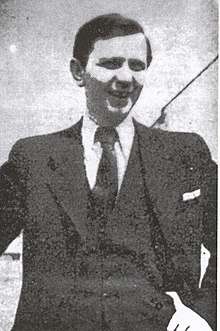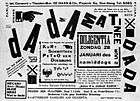Dragan Aleksić
Dragan Aleksić (Serbian Cyrillic: Драган Алексић, 22 December 1901 – 22 July 1958)[1] was a Yugoslav Dadaist poet, author, journalist, filmmaker and founder of the Yugoslavian branch of Dadaism, termed "Yugo-Dada."[2]
Dragan Aleksić | |
|---|---|
 | |
| Born | 22 December 1901 Bunić, Austria-Hungary |
| Died | 22 July 1958 (aged 56) Belgrade, FPR Yugoslavia |
| Occupation | Writer |
| Period | 20th century |
| Genre | Poetry, essay |
| Literary movement | Dada |
Studies in Prague
From 1920 Aleksić studied Slavic languages in Prague, where he coincidentally discovered his penchant for Dadaism and incorporated it both in his speech and in the form of his written manifesto. He also wrote stories, poems, plays and publicly declared himself a theoretician of "organic art" - orgart. In his own words, he was in contact with leading European Dadaists: Kurt Schwitters (Hannover), Raoul Hausmann, Walter Mehring, Richard Huelsenbeck (Berlin), Max Ernst (Cologne), Tristan Tzara (Paris).
Collaboration with Zenit
Aleksić started publishing his poems in collaboration with Ljubomir Micić's avant-garde magazine Zenit. Despite initially dismissing the Dada movement in the 2nd issue of the magazine in March 1921, the following April issue contained an article by Dragan Aleksić written from Prague, as well as two of his Dadaist poems. Up to and including the 13th issue of Zenit, Aleksić's reviews and poems appeared in the magazine regularly.[3]
He organized public events of Dadaism and Zenitism with Branko Ve Poljanski, who left the art and theater scene in Slovenia and traveled to Prague via Vienna. Aleksić met Karel Teige and Jaroslav Seifert, members of the Czech avant-garde group Devětsil and became acquainted with their work. During his summer holidays, he returned to Yugoslavia where he lived and worked between Vinkovci, Zagreb, and Belgrade. Concurrent with his work with Zenit, he established a "purebred troop" of Dadaists, intending to develop the group into a movement. Aleksić notified Tzara of these developments in May 1922. Members of the troop included: Dragan Sremac, Vido Lastov, Slavko Stanić (Šlezinger), Mihailo S. Petrov, Antun Tuna Milinković (Fer Mill).
However, there was an abrupt break with Zenit in May 1922. The final words of the 14th issue announced the excommunication of Aleksić from the Zenitist circle, as well as the author Mihailo S. Petrov, also a regular contributor in the early issues of the magazine. The same issue announced an upcoming single issue periodical titled Dada-Jok, edited by Poljanski and parodying Dadaism.[3]
Dada-Tank and Dada Jazz
In response to the initial strikes by the Zenitists, Aleksić published two of his own single issue publications in Zagreb – Dada-Tank in June and Dada Jazz in September 1922.[3]
Dada-Tank was published in collaboration with Tristan Tzara and Kurt Schwitters, including picture-poems and graphics by Mihailo S. Petrov, as well as a translation of a poem by Erwin Enders, originally published in the Hungarian avant-garde journal MA. Although Dada Jazz has been characterized as a mere footnote to Dada-Tank, it was in fact a very different project. Its cover designated it to be a "Dada anthology", analogous to Richard Huelsenbeck's Dada Almanach, which Aleksić had translated and excerpted in Dada-Tank.[3]
See also
References
- Béhar, Henri (2005). Dada circuit total (in French). Lausanne: L'âge d'homme. pp. 333–348. ISBN 978-2-8251-1906-8. Retrieved 26 June 2020.
- "DRAGAN ALEKSIĆ". Avantgarde Museum. Retrieved 16 April 2019.
- Seely Voloder, Laurel; Miller, Tyrus (2013). "Avant-Garde Periodicals in the Yugoslavian Crucible" (PDF). The Oxford Critical and Cultural History of Modernist Magazines. New York: Oxford University Press. 3: 1099–1127. Retrieved 26 June 2020.
